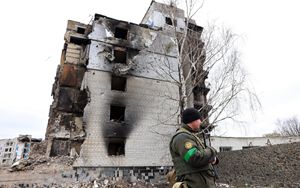(Finance) – New military aid for 1.13 billion euros, which adds to the 28 billion already sent over time from Berlin to Kiev. This is what was established at thesecurity agreement signed in the German capital by the chancellor Olaf Scholz and Ukrainian President Volodymyr Zelensky.
“For the first time in its history” Germany “takes on the role of guarantor state”, underlines a note from the German Defense Minister, Boris Pistorius. The agreement with Kiev is a clear sign of “increased German responsibility in security policy in Europe”, Pistorius further says.
The German Defense Ministry called the new aid the “Munich package“. The package includes 18 additional Pzh 2000 self-propelled howitzers, which will be delivered from 2026 to 2027 (including training, ammunition and spare parts). Between 2025 and 2027, 18 Rch 155 wheeled self-propelled howitzers (which will add to the same number already planned.) Germany will also send 120,000 122 mm artillery ammunition to Ukraine for the first time this year. In 2025, Kiev will also receive a second Skynex air defense system from Berlin and, in 2024, further 100 IRIS-T SLS missiles (in addition to those already planned).
Berlin, Chancellor Scholz said, sends “a clear message” to Vladimir Putinthat is what we will continue to support Ukraine. The chancellor stressed that Berlin’s support for Kiev will continue “as long as there is a need.”
The German chancellor He also appealed to the US Congress to “authorize the decisions necessary to guarantee support” for Ukraine, given that US support remains “essential” for Kiev. Scholz said this in Berlin, at a press conference with Ukrainian President Volodymyr Zelensky. The Ukrainian president said he is counting on American help, even if there are some “radical” voices in the US. “However, I believe we will have the usual pragmatic approach of the United States,” Zelensky said.
On the fighting front, meanwhile, Kiev announces that after many months of clashes the decision has been made to withdraw from the Zenith position on the south-eastern outskirts of Avdiivka: this was stated by the commander of the operational-strategic group of troops “Tavria”, General of brigade Oleksandr Tarnavsky. “We held this position as long as it enabled us to effectively deter and destroy the enemy,” he said. And he added that the decision to leave the position was made to “preserve the military and improve the operational situation.” Violent fighting is underway in the city of Donetsk. The Ukrainian army says that Russian troops have been encircling Kiev’s forces for days. Fierce battles would be taking place inside the city.
The battle of Avdiivka is in a “critical” phase and more difficult than that of Bakhmut, which lasted months until the conquest of the Ukrainian city by the Russian army. A spokesman for the Ukrainian forces fighting in the area said this on Friday.
The Ukrainian president stated that in the situation in which Avdiivka finds itself, that is, with the Russian army raging to conquer it, he asks the military leadership first of all to save the lives of the defenders of Ukraine. “Let us remember what Russia is doing to our cities and villages: they will not calm down until they completely destroy all living things there,” she said. “Our people, our military, heroically defend strategic structures, logistical routes that can lead the enemy to advance. I will not say what new approaches our military is using in Avdiivka. Their task is to do everything to protect our people. And this is my main signal: our army is the most important thing we have, and this is our most important weapon“, concluded Zelensky.
The Secretary General of NATO, Jens Stoltenberghe underlined the importance of accelerating war production to support Ukraine and achieve stable peace. Stoltenberg said this shift towards high-paced industrial production, typical of times of conflict, will not only benefit Ukraine, but also NATO by generating quality jobs. Furthermore, he highlighted that the creation of Patriot missiles in Bavaria illustrates the contribution of the defense industry to regional security.
Meanwhile, the Ukrainian President Volodymyr Zelensky arrived in Berlin to meet Chancellor Olaf Scholz and German Federal President Frank-Walter Steinmeier, with the intention of signing a bilateral security pact between Germany and Ukraine, aimed at long-term commitments and support. The visit was characterized by security precautions and Zelensky will later travel to Paris, where he is expected as a guest at the Munich Security Conference. In the meantime, Moscow said it shot down five Ukrainian drones, one in Russia’s Belgorod region and four over the Black Sea, claiming to have prevented an alleged terrorist attack by the Kiev regime. The statement follows a rocket attack by Ukrainian forces on Belgorod, which caused casualties and injuries, according to Russian authorities.
